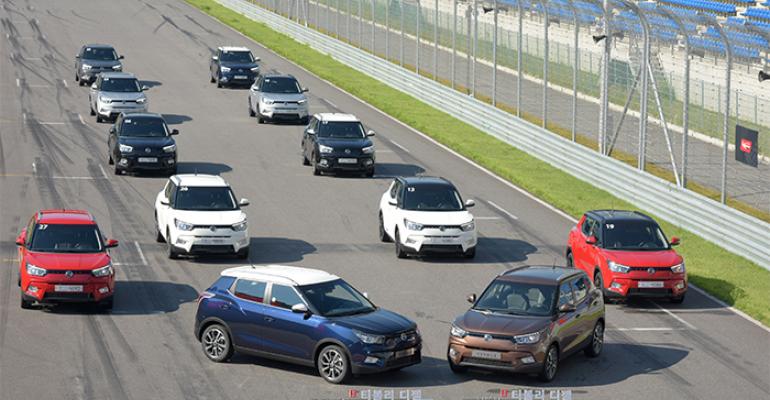Ssangyong looks to build on the success of the Tivoli compact CUV by adding a diesel version.
Releasing the diesel in Korea and overseas should buoy Tivoli sales and help the flailing automaker reach break-even next year, CEO Choi Johng-sik says.
Choi says during the Tivoli diesel’s Korean sales launch earlier this month that Ssangyong, a subsidiary of Indian automaker Mahindra & Mahindra, will be in a turnaround position if it sells 170,000 or more vehicles in 2016.
Choi says the diesel version, which had been released for export a few weeks earlier, will help the Tivoli boost Ssangyong’s overall sales this year to between 150,000 and 160,000 and he projects 2016 global deliveries will range from 170,000 to 180,000. This compares with Ssangyong’s total global sales of 140,000 in 2014.
The total could hit 200,000 in 2016 if Ssangyong can sell 100,000 units in export markets, the CEO says. That is a highly ambitious target; for the first six months of 2015 Ssangyong exported 24,168 units, down 41% from 40,706 in like-2014.
Without the Tivoli, which accounted for 39% of first-half exports with 15,687 deliveries, the tally for the 6-month period would have been just 25,687 units, off 61% from year-ago.
Domestic sales for the first six months of 2015 totaled 45,410, a gain of 37%. Without the Tivoli, which logged 18,524 deliveries for 41% the total, sales would have come to 26,886 units, a decline of 19% from prior-year.
Ssangyong expects the diesel option to give Tivoli sales a further boost.
Its Euro 6 compliant e-XDi 1.6L 115-hp mill offers more power and quicker acceleration than the 1.6L 126-hp gasoline-powered engine.
The diesel delivers maximum torque of 111 lb.-ft. (151 Nm) over the 1,500- to 2,500-rpm range, while the gasoline version develops 118 lb.-ft of torque (160 Nm) at 6,000 rpm.
Fuel efficiency for the diesel is 36 mpg (6.5 L/100 km) compared with the gasoline engine’s 44 mpg (5.3 L/100 km).
“The Tivoli diesel is a car that combines the highest level product standards in design, safety and convenience of the gasoline model, with a powertrain optimized for Korean driving conditions to meet the need for high performance and fuel efficiency,” Choi said at the launch event.
The Tivoli diesel released in Korea is priced at 20.5 million-25 million won ($18,000-$22,000), compared with 18 million-23.5 million won ($15,800-20,700) for the gasoline model. Pricing is similar in local currency equivalents in most overseas markets.
Managing Director Shin Young-sik says the sales split between diesel and gas versions is expected to be 50/50. Even if the diesel Tivoli outsells the gas model and changes that ratio, it won’t matter. Ssangyong produces both bodies in its Pyongtaek plant and both engines in its Changwon factories.
Other Ssangyong models continue to languish.
Through June the Rexton sold 4,715 units globally, down 36% from first-half 2014; the Korando C sold 14,904 units (-48%); the Korando Sports sold 17,303 (-11%); and the Korando Turismo 4,753 (-42%).





